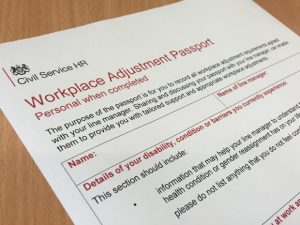
Maria works at the Home Office in Croydon. She has sickle cell – a disorder of the haemoglobin in the red blood cells. As Deputy Civil Service Disability Champion, I enlisted the help of the Civil Service Workplace Adjustment Service to speak to Maria and find out more about sickle cell – how it impacts on her life and work, how she manages her condition and what workplace adjustments she has to support her.
Maria’s story:
“Sickle cell doesn’t define me – I am a person who happens to have sickle cell. A lot of people think sickle cell is a condition that affects only black people. It’s a serious, hidden condition that affects people in malarial regions including the Middle East, Asia and Africa affecting anyone. If malaria is present, there’s sickle cell too. There’s a lot of misunderstanding and ignorance around sickle cell.

I was diagnosed with sickle cell when I was seven years old. Sickle cell affects people in different ways. I have a compromised immune system. My key trigger for a sickle crisis (painful episodes which on average can last up to 7 days) is low temperature – blood clots in my arteries and joints due to low oxygen levels. Cold temperatures can also cause blood clots. I dress appropriately and wear plenty of layers. I’m prone to contracting infections easier than the general population. I’m chronically anaemic and and I can experience fatigue. I keep well by exercising and resting. This has triggered only 5 sickle crises during my life.
When I started work many years ago, my employer didn’t fully understand my condition and it was ignored. My manager did not understand my absences were caused by my illness until my doctor wrote a strongly worded letter due to me sitting in a section of the office with a cold draught.
When I applied for my first job in the Civil Service, my mum encouraged me to disclose my condition on the application form. Sickle cell has not limited my career progression or opportunities at work. I didn’t always get the help I needed earlier on in my career. I wasn’t considered for opportunities to work overseas until my consultants wrote to the FCO Chief Medical officer to provide more information about my condition. It was only when I had an occupational health assessment in 2012, things changed for me, my determination and not letting the disease limit me has been key to my progression. I have had a varied career despite having the condition, from serving abroad as an immigration officer to working on the Olympics Security Programme. I started as an AO and I’m now a Grade 7, still looking for career progression.
Sickle Cell Disease – the facts
- People with sickle cell are born with the condition
- It can only be inherited from both parents each having passed on the gene for sickle cell
- The main symptoms are anaemia and episodes of severe pain in the chest, joint and bones. This can cause headaches, brain aneurysms and strokes.
- The pain occurs when the cells change shape after oxygen has been released
- The red blood cells then stick together, causing blockages in the small blood vessels
- These painful episodes are referred to as sickle cell crisis
- Treatment can include strong painkillers such as morphine to control the pain
- Over time people with sickle cell can experience damage to organs such as the liver, kidney, lungs, heart and spleen
- Death can also result from complications of the disorder
- Treatment mostly focuses on preventing and treating complications
- Sickle cell is not contagious
- The only possible cure for the disorder is bone marrow transplant but this is only possible for a limited number of affected people and depends on a suitable donor
- Approximately 15,000 people in the UK have a sickle cell disorder
Workplace adjustments weren’t in place over 20 years ago, which I’m pleased to say are now well supported and encouraged in the Civil Service. I had my first Occupational Health referral back in 2012. I felt a sense of relief that the OH consultant understood my condition immediately and provided support. They understood the impact of my condition on my health, my work and the importance of my working environment.
I make sure my phone contacts are up-to-date in case my colleagues need to make emergency contact with my family. My immediate colleagues know about my condition. I also carry a Green Medical Identity Card which includes information on my condition and blood type, to ensure I’m treated promptly at hospital.
Sickle cell is a serious progressive condition and has major risks. Tragically, I’ve lost two siblings to sickle cell. From a psychological perspective, it can be debilitating at times. I have access to professional help, and I’ve got a good support network around me.
When I change job roles, I share my Occupational Health report with my new manager so they can properly understand my condition, the impact and associated risks and the workplace adjustment recommendations and advice provided by Occupational Health. You can also record your agreed workplace adjustments on the Civil Service Workplace Adjustment Passport.
Anybody who feels they need a workplace adjustment to support a disability or condition should speak to their manager. Don’t be afraid to speak out about your workplace adjustment requirements, which you can do in confidence. Help, advice and support is available.”
Civil Service Workplace Adjustment Passport
- The passport is a Civil Service product that employees are encouraged to use to record their agreed workplace adjustments – it forms a key part of the Civil Service Diversity Strategy
- The passport aims to provide workplace support for employees with a disability, condition or for anyone who is undergoing gender reassignment
- It will also be of help when an employee moves to a different department, changes job role, or changes managers
- The passport supports and encourages conversations between an employee and their manager about workplace adjustments, and acts as a record of that conversation and of the agreed adjustments
- You can download the Passport from Civil Service Learning

2 comments
Comment by Subrata Dey posted on
Thank you, Maria, for sharing your personal reflections and for the facts you gave us about sickle cell. Your bravery will inspire others to achieve their potential as well as educating people about understanding the condition and its effects.
Comment by Gavin Thomas posted on
Thank you Maria for sharing with us your personal story and for educating us about Sickle Cell. I had some knowledge on this condition as I had a relative who had it, but I was not fully aware on the impact that it could have on day to day life.
I commend your bravely for talking so openly about this and for what you have managed to achieve in your career. I hope that it will inspire others.
It is such a great example of how the reasonable adjustments system can have such a significant effect and enable colleagues to be able achieve their potential.